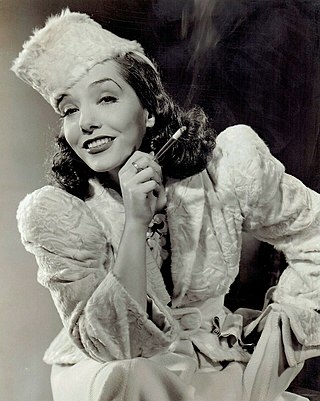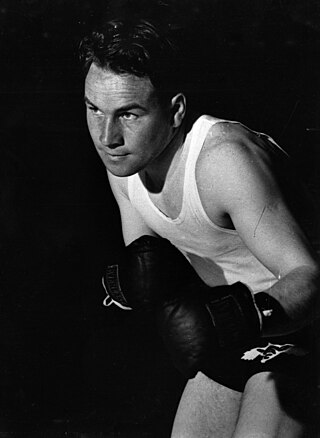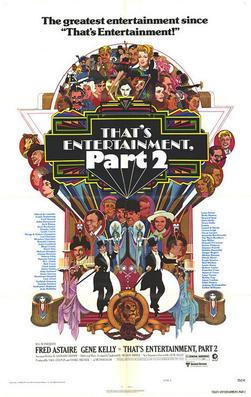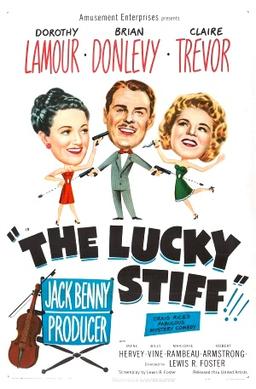
James Francis Durante was an American comedian, actor, singer, and pianist. His distinctive gravelly speech, Lower East Side accent, comic language-butchery, jazz-influenced songs, and prominent nose helped make him one of the United States' most familiar and popular personalities of the 1920s through the 1970s. He often referred to his nose as the schnozzola, and the word became his nickname.

This is a list of notable events in music that took place in the year 1933.

Joe Palooka was an American comic strip about a heavyweight boxing champion, created by cartoonist Ham Fisher. The strip debuted on April 19, 1930 and was carried at its peak by 900 newspapers. It was cancelled in 1984.

María Guadalupe Villalobos Vélez, known professionally as Lupe Vélez, was a Mexican actress, singer, and dancer during the Golden Age of Hollywood cinema.

James Francis McHugh was an American composer. One of the most prolific songwriters from the 1920s to the 1950s, he is credited with over 500 songs. His songs were recorded by many artists, including Chet Baker, June Christy, Bing Crosby, Deanna Durbin, Ella Fitzgerald, Judy Garland, Adelaide Hall, Billie Holiday, Beverly Kenney, Bill Kenny, Peggy Lee, Carmen Miranda, Nina Simone, Frank Sinatra, and Dinah Washington.

James Archibald McLarnin was an Irish professional boxer who became a two-time welterweight world champion and an International Boxing Hall of Fame inductee.

Stuart Erwin was an American actor of stage, film, and television.
"The Gang That Sang Heart of My Heart" is a popular song. The music and lyrics were written by Ben Ryan (1892–1968) in 1926. It reminisces about being in a youthful quartet, singing "Heart of My Heart".

Marjorie Burnet Rambeau was an American film and stage actress. She began her stage career at age 12, and appeared in several silent films before debuting in her first sound film, Her Man (1930). She was twice nominated for the Academy Award for Best Supporting Actress for her roles in Primrose Path (1940) and Torch Song (1953), and received the 1955 National Board of Review Award for Best Supporting Actress for her roles in A Man Called Peter and The View from Pompey's Head.

That's Entertainment, Part II is a 1976 American compilation film released by Metro-Goldwyn-Mayer and a sequel to That's Entertainment! (1974). Like the previous film, That's Entertainment, Part II was a retrospective of famous films released by MGM from the 1930s to the 1950s. Some posters for the film use Part 2 rather than Part II in the title.
"Inka Dinka Doo" is a 1933 popular song whose words were written by Ben Ryan, and whose music was composed by James Francis "Jimmy" Durante.

Hollywood Party, also known under its working title of The Hollywood Revue of 1933 and Star Spangled Banquet, is a 1934 American pre-Code musical film starring Laurel and Hardy, The Three Stooges, Jimmy Durante, Lupe Vélez and Mickey Mouse. It was distributed by Metro-Goldwyn-Mayer. Each sequence featured a different star with a separate scriptwriter and director assigned.

This Time for Keeps is a 1947 American romantic musical film directed by Richard Thorpe and starring Esther Williams, Jimmy Durante, Johnnie Johnston and opera singer Lauritz Melchior. Produced by MGM, it is about a soldier, returning home from war, who does not wish to work for his father's opera company or to continue his relationship with his pre-war lover.

Yestergroovin' is the thirty-ninth studio album by guitarist Chet Atkins, released in 1970. Yestergroovin' was nominated for the 1970 Grammy Award for Best Country Instrumental Performance. It did not win, but Atkins's collaboration with Jerry Reed Me and Jerry did. He would be nominated twice in the same category again in 1973.
The Chez Paree was a Chicago nightclub known for its glamorous atmosphere, elaborate dance numbers, and top entertainers. It operated from 1932 until 1960 in the Streeterville neighborhood of Chicago at 610 N. Fairbanks Court. The club was the epitome of the golden age of entertainment, and it hosted a wide variety of performers, from singers to comedians to vaudeville acts. A "new" Chez Paree opened briefly in the mid-1960s on 400 N. Wabash Avenue and was seen in the film Mickey One with Warren Beatty.

Two Girls and a Sailor is a 1944 American musical film directed by Richard Thorpe and starring Van Johnson, June Allyson and Gloria DeHaven. Set on the American homefront during World War II, it's about two singing sisters who create a lavish canteen to entertain members of the military, thanks to financial contributions from a mysterious donor. The picture features a host of celebrity performances, including Jimmy Durante doing his hallmark "Inka Dinka Doo", Gracie Allen, and Lena Horne. Richard Connell and Gladys Lehman were nominated for the Academy Award for Best Original Screenplay.
Bennett A. "Ben" Ryan was an American songwriter who wrote the music and lyrics to the popular song "(The Gang that Sang) Heart of My Heart". He also wrote or co-wrote many other popular songs including "Inka Dinka Doo", "M-I-S-S-I-S-S-I-P-P-I", "No Nothing", "The Thrill of a New Romance", "When Frances Dances with Me", and "When I Send You a Picture of Berlin"
Six Hits and a Miss was an American swing-era singing group. The group consisted of six male singers and one female. They performed musical numbers in several Hollywood films of the 1940s, such as Time Out for Rhythm, The Big Store, Hit Parade of 1941, and Girl Crazy.

The Lucky Stiff is a 1949 American comedy crime film directed by Lewis R. Foster, starring Dorothy Lamour, Brian Donlevy, and Claire Trevor. The film is based on the 1945 novel of the same name by Craig Rice.
Four Star Revue was an American variety/comedy program that aired on NBC from October 4, 1950, to December 26, 1953.













